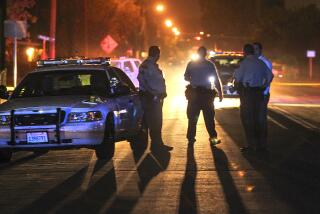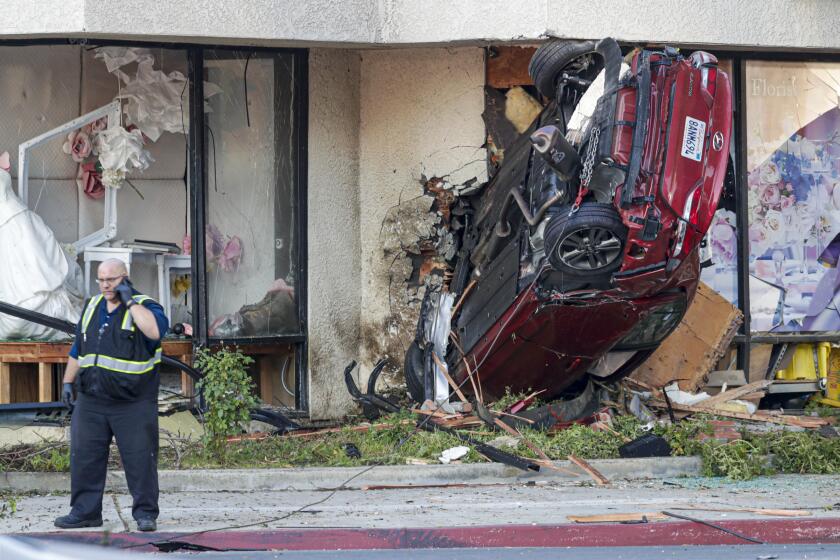Editorial: California needs to provide better help for crime victims

California provides money and other assistance to victims of violent crime, but the aid is available only to those who know to ask for it. Nearly 100 applications are denied each year because they’re filed late, perhaps because it took too long for victims to learn of the program, or perhaps because they were too busy dealing with the trauma or other consequences of the crime. And, of course, it’s impossible to know how many people never do learn they are eligible for compensation. A common-sense bill working its way through the Legislature would solve a portion of the problem, and that’s a start.
Senate Bill 375 by Sen. Maria Elena Durazo (D-Los Angeles) would extend the three-year window for filing most claims to 10 years. It’s a good bill and deserves passage. And it’s noteworthy that it has the rare dual backing of Crime Victims United, which over the years has played a lead role in toughening criminal laws and sentencing, and Californians for Safety and Justice, one of the architects of the state’s recent criminal justice reforms.
There need be no contradiction between assisting crime victims and rethinking excessive sentences. Indeed, the body of recent reforms that shorten some sentences, encourage perpetrators to participate in rehabilitation programs and aid their reentry into society after jail or prison should be judged in part by their effectiveness in reducing crime. Reforms that might appear to be victimizing greater numbers people than would have been injured otherwise may have to be reexamined.
California must take responsibility for crime and its consequences, and that includes helping people get back on their feet.
In fact, though, violent crime has continued a historic drop in most of California since the adoption of criminal justice reforms that reduce drug possession and a few property crimes from felonies to misdemeanors, and that assign jurisdiction over some felonies to county instead of state corrections officials.
But there are still too many violent crimes and too many innocent people hurt.
Like any society, California must take responsibility for crime and its consequences, and that includes helping people get back on their feet after they have been victimized. The state has had some form of crime victim assistance since 1965. Today, the California Victim Compensation Program helps to pay medical bills, cover lost income, support dependent family members, clean up crime scenes and assist with the many other expenses that follow threatened or actual injury. The fund is replenished by criminal court fines and is supplemented by federal matching funds.
Compensation from the fund is separate from court-ordered restitution, in which the convicted offender pays the victim directly without the state as an intermediary. Both kinds of payment are appropriate. Relying on direct restitution alone would put an undue burden on the injured party to follow court proceedings and take whatever other actions might be necessary to get repaid.
The state fund compensates victims without requiring them to rely on or be in direct contact with those who victimized them. It also maintains a distinction between the injured party’s proper role as a person who deserves compensation and the improper role of a punisher.
Enter the Fray: First takes on the news of the minute »
That distinction is something California hasn’t always gotten right. Various victims’ rights bills and ballot initiatives have come close to the line that separates care and compensation from vengeance. For example, the version of Marsy’s Law that California voters approved in 2008 gave crime victims a new and inappropriate role in prosecutions and parole hearings. Such moves substitute victims, who have every right to be hostile toward their assailants, for impartial prosecutors, judges and juries. A modern, free society’s criminal justice system takes on itself the prosecution of crimes and imposition of punishment so as to avoid a cycle of personal vendetta and to ensure that all injured people are protected and compensated, whether or not they have the stomach and the savvy to follow the perpetrator’s various court and parole hearings.
But the compensation part should be simple. Much simpler, in fact, than it currently is, or even would be if SB 375 is passed and signed into law. A longer time to apply for aid is good as far as it goes, but it doesn’t do anything to alert crime survivors that aid exists. Lawmakers ought to follow up with legislation that provides the Victim Compensation Board with the resources — and the obligation — to do better outreach and ensure that more injured people are compensated in a way that helps them recover.
Follow the Opinion section on Twitter @latimesopinion and Facebook
More to Read
A cure for the common opinion
Get thought-provoking perspectives with our weekly newsletter.
You may occasionally receive promotional content from the Los Angeles Times.






